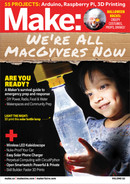
T
he local police department just had to get it
off their chest. After a recent storm caused
a power outage and fallen trees, the department
was inundated with so many 911 calls, they
couldn’t handle the volume. So they posted a
message on Facebook about how not to use 911:
The police wanted people to know that 911
was not an information hotline. It should be
used to report crimes and other life-threatening
emergencies. They couldn’t answer every
question. This too-pointed message, once posted,
wasn’t well received by city officials.
Yet 911 calls highlight a core problem in an
emergency of any kind. A lot of people need
help and they don’t know how to get it. They feel
helpless so they need to talk to someone. What
do you do in a flood, fire, blizzard, storm surge,
drought, earthquake, hurricane, or tornado? How
about a pandemic, which we didn’t see coming?
How might we prepare for all those situations?
One type of person considers himself a “prepper,”
a superhero of survival. They anticipate food,
power, and water shortages. They have a backup
plan for their backup plan. Their garage or shed
is full of specialty off-the-grid gear. They are
determined to save themselves and their family.
But what about all those other people calling 911
and worrying about what’s happening to them?
The area where I live has experienced wildfires
and floods in recent years, such that emergencies
are no longer unexpected events. There are now
local efforts to prepare for handling a wide range
of unforeseen problems. The basic idea is mutual
aid — how do we help each other get through an
emergency, knowing it might be a while before
police and fire departments are able to respond?
Our town’s program is called Map Your
Neighborhood, based on a model developed in
Washington state. It could be summed up as “Get
to Know Your Neighbors.” Get together and talk
with each other. (On the tail end of Covid, this is
admittedly awkward.) Get to know what skills and
capabilities your neighbors have and what they
care about. Get to know who the most vulnerable
are in your neighborhood and how to help them.
An elderly person who doesn’t drive might need
help in an evacuation or have medication that
requires refrigeration during a power outage.
Who has a reliable generator or solar battery
backup? Who has experience as a plumber,
electrician, or arborist?
Our fire department is working with citizens
to build a local radio communications network
(using FRS, GMRS, and ham radios) so that a
community without internet or landlines can
still pass messages back and forth. People can
ask for help and get an answer. It’s calling on
neighbors to help neighbors. By combining the
power of DIY and DIT (Do-It-Together), we can
MacGyver the capabilities of the community for
the benefit of all.
Adobe Stock - Oleksandr Miedviedie
• We don’t know why the power is off, how it
got turned off, or when it is getting turned
back on.
• We do not have the number to a plumber or
gutter company.
• We don’t know if the freeways are open or
not; and there isn’t a freeway in this town.
• We can’t do anything about a tree that fell in
an empty lot.
• We’re sorry the horses, cows, sheep, and
other livestock look like they are having a
miserable time standing in the rain. But
they live outside, and they’ll be OK.
• We don’t know if it’s going to flood, when it’s
going to flood, or where it’s going to flood.
7
make.co
WELCOME
Who You Gonna Ca?
by Dale Dougherty, President of Make: Community
M82_007_Welcome_F1.indd 7M82_007_Welcome_F1.indd 7 7/11/22 11:53 AM7/11/22 11:53 AM
..................Content has been hidden....................
You can't read the all page of ebook, please click here login for view all page.
